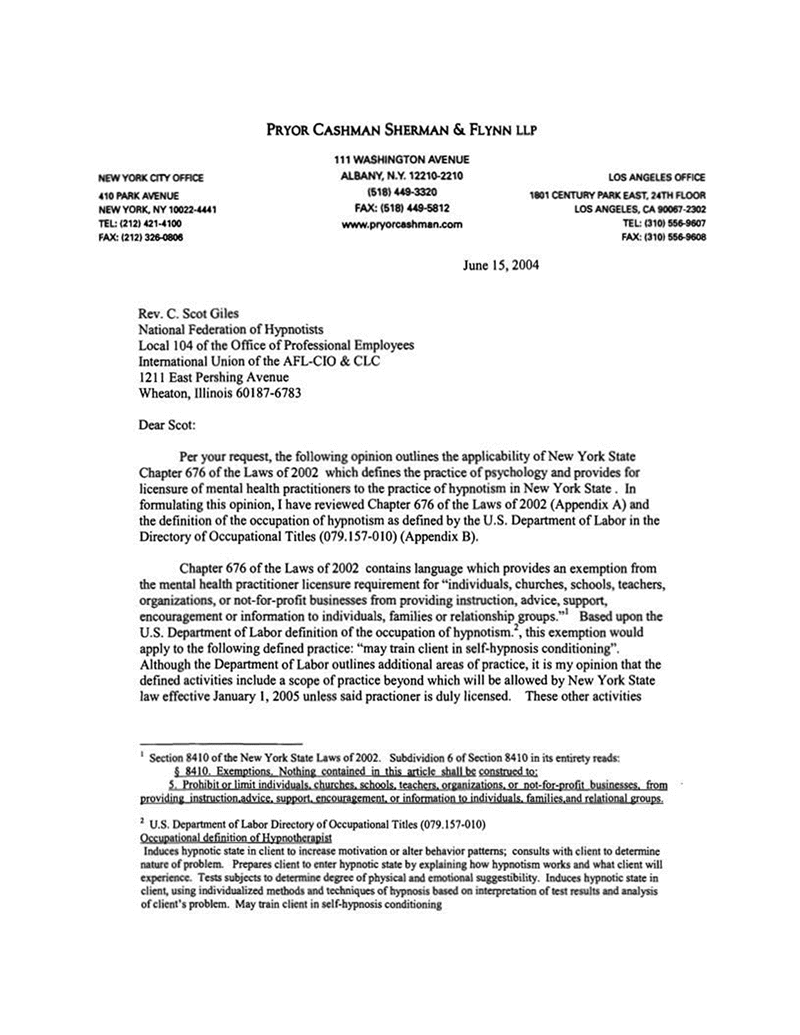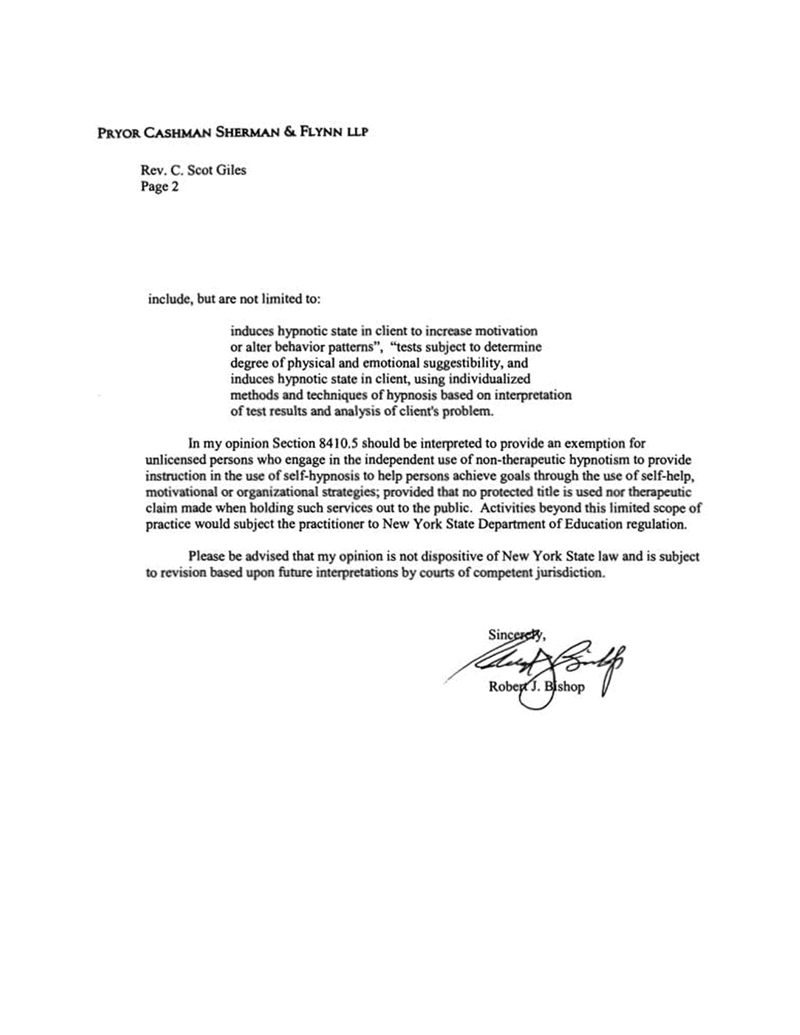Practicing Hypnotherapy in New York
Summary
Disclaimer: The following summary is a non-legal interpretation of how the hypnotherapy authors interpret the law as it applies for hypnotherapists. This is not a substitute for legal advice.
In New York, there are no specific state laws restricting the practice of hypnosis or hypnotherapy.
The National Guild of Hypnotists provides guidelines for practicing hypnotists, recommending that they call themselves hypnotists instead of hypnotherapists, use non-therapeutic terminology, and avoid making medical or psychological claims. Hypnotists should represent their services as self-hypnosis instruction and follow the approved standards and terminology to remain compliant.
Legal Case Highlights
As of the date of this publication, we were unable to find any known legal cases in this state where someone has faced legal action just for practicing hypnosis or hypnotherapy. (Unless there was a legal case in that state.)
Hypnotherapists
Important Note: Estimating the number of hypnotherapists practicing in any state is difficult if there is no state licensing or registration act in that state. This resource provides very rough estimates that are grossly under reported by Googling hypnotherapists who are actively advertising in that state.
As of 2024, there are approximately 130 hypnotherapists practicing/advertising in the State of New York.
Laws and Regulations
Research did not reveal any New York state laws or regulations restricting the practice of hypnosis or hypnotherapy.
Notes
-
The National Guild of Hypnotists released its interpretation of New York hypnosis law: May 2005
As the 2005 legislative season draws to a close the Guild wants to update you on legislation in your state and remind you of changes you may need to make in your practice. This file is intended to put into your hands the documents you need in order to keep your practice both safe and legal. This file was created by the Guild’s New York Governmental Concerns Task Force, consisting of Dwight Damon, C. Scot Giles and Anthony DeMarco, assisted by the law firm of Pryor Cashman Sherman and Flynn, LLP and Guild legal counsel.
First, we must begin with a disclaimer. As the Mental Health Law has just come into existence, you must realize that there have been no official interpretations of the scope of the law by the Courts or other bodies of competent jurisdiction. Therefore, the National Guild of Hypnotists provides this information to you in good faith with an intent to help, but assumes no responsibility for its opinions that are rendered solely as an effort to promote full compliance with the existing law. This letter is not intended as a blueprint to circumvent the New York mental health laws but is intended to provide guidance to legitimately practice as a Certified Hypnotist, which the Guild does not consider to be “mental health” practice.
As background, two years ago the New York Legislature passed a comprehensive behavioral health license law. The law went into effect in 2005 and enforcement will begin in 2006. The language in the law is very broad and if you practice any form of mental health care you will need to be licensed. Licensure requires an accredited Master’s Degree in one of the standard mental health disciplines and passing a test administered by the New York State Department of Education. The law does not regulate the practice of hypnotism specifically. However, it will certainly regulate anyone who holds services out to the public as psychotherapy, counseling or hypnotherapy (defined as the use of hypnotism in the treatment of mental disorders).
In 2005 the law was expanded to include Biofeedback Therapy as a licensed activity requiring a Master’s Degree. The Scope of Practice of a Licensed Biofeedback Therapist states:
“In addition to teaching self-regulation by the use of such [biofeedback] instruments, other methods promoting health and coping skills taught by the biofeedback therapist include, but are not limited to, diaphragmatic breathing, progressive relaxation, autogenic training, imagery, psycho- physiological therapy and cognitive restructuring.”
While this new section does not mention hypnotism, it must be noted that it does mention techniques that hypnotists also employ. It is allowable under the law for a hypnotist to use these techniques provided the hypnotist does not employ these techniques for any purpose regulated by the behavioral health license law.
The Guild has obtained a legal opinion that states that you do not need to be licensed as a behavioral health professional to practice hypnotism in New York, provided you strictly follow the Standards and Terminology of the National Guild of Hypnotists. However, as noted above, there are no official representations or court cases to provide guidance in this area and the Guild legal opinion is just that, an opinion. The Guild assumes no responsibility for any actions taken against any hypnotist by the State of New York under its Comprehensive Behavioral Health License Law. Additionally, the Guild does not warrant protection from any enforcement action, notwithstanding the suggestions made in this letter.
Our suggestions are as follows:
- You must call yourself a hypnotist, not a hypnotherapist.
- You should not display any certificate that uses any other title. The Guild will issue you a Certified Hypnotist certificate to replace any Guild certificate using a different title in return for a small processing fee of $6.00.
- You must call what you do hypnotism, not hypnotherapy and certainly not counseling or psychotherapy.
- You must hold your services out to the public as a form of self-hypnotic instruction to empower clients. Basically, you must represent yourself as a success coach, motivator and guide, not as any form of mental health professional. Your advertising in all media must strictly follow this requirement.
- You must use only the nontherapeutic terminology approved by the National Guild of Hypnotists when representing your services or discussing issues with clients.
- You must not use diagnostic nor psychological language with clients, either as a description of their problem nor for what you do except when working on referral from an appropriately licensed behavioral health professional.
-
You should add to your Client Bill of Rights the following paragraph:
“The services I render are held out to the public as nontherapeutic hypnotism, defined as the use of hypnosis to inculcate positive thinking and the capacity for self-hypnosis. I do not represent my services as any form of medical, behavioral or mental health care, and despite research to the contrary, by law I may make no health benefit claims for my services.”
- Attorneys for the National Federation of Hypnotists wrote this opinion about New York hypnosis law:
-
Below is the personal opinion of hypnotist Anthony F. De Marco – who was part of a three person team that considered the terms of the relevant New York law with the guidance and counsel of a New York attorney who rendered them an opinion as to the parameters of that New York law:
New York Mental Health Law as Related to the Practice of Hypnosis
When new State legislation has been passed, there is usually confusion as to the proper interpretation and application of the contents of the Law to various groups and individuals. Such is the case with Chapter 676, Laws of New York, 2002, Rules and Regulations for Mental Health Practitioners, as it may apply or specifically affect persons that practice hypnotism in the State of New York. Although this Law took effect in 2006, there have been no true interpretations of the meaning (application) of the Law to hypnotists through Court-established precedent or governmental activities concerning enforcement by which one could definitely reach a conclusion as to the parameters of the Law. One may think that 10 years is a long time and that every aspect of the Law should have come to light, but there are thousands of Laws in the States that just lie dormant or relatively un-enforced and un-interpreted, but subject to being enforced at any given time.
In 2004-2005 I was part of a three man team that considered the terms of the New York legislation in question relative to the practice of hypnotism. We also had the guidance and counsel of a New York attorney who rendered us an opinion as to the parameters of the law. There were conclusions made by the team which are always ‘non- binding’ in nature as persons who have questions and issues with the existing Law are always advised to seek their own privately retained counsel. Over the past 30 years I have found that hypnotists sometimes react to advice that does not coincide with their desires or needs, but all that any person that renders an opinion such as this can do is state what he or she believes is the correct interpretation and application of the Law or other happenings in the daily affairs of hypnotists in the practice of their profession.
The suggested practice of hypnotism by persons in New York State who are not licensed mental health professionals. The “do’s” and “don’t’s”:
- The term ‘therapy’ is not to be used.
- The terms ‘hypnotherapy’ and ‘hypnotherapist’ are not to be used.
- Use only earned titles
- Practice non-therapeutic hypnosis. (There is no opinion given here on practicing therapeutic hypnosis with a written referral from a licensed health professional, as this is always a gray area when not specifically mentioned and authorized by State Statute)
- Your hypnotic services to the public should be founded on and with arrival at mutually–agreed goals through the employment of self-hypnosis instruction
- Use the correct terminology in advertising and case-writing to avoid being accused of practicing therapeutic hypnotism.
- Be especially careful with advertising to avoid making therapeutic claims in your website, flyers, business cards, facebook, twitter, and all media.
- Use terminology that may be recommended by reliable hypnosis organizations of which you may be a member.
- Do not diagnose, nor offer a prognosis, nor prescribe.
- Practice on the side of caution.
- The client is the most important person in the hypnotist-client relationship and must be protected by you, the hypnotist, practicing within your own personal limits and within the limits of existing Law whether you agree with said Law or not.
NOTE: This is a personal opinion of hypnotist, Anthony F. De Marco, and is not intended to be used as ‘legal advice.’ It is not an opinion of COPHO or any of its Members. Seek proper legal advice from a privately retained attorney in your State if there are any unanswered questions, confusion, or issues that should be resolved concerning the conduct of your practice.
Research Note: The hypnotherapy research summarized in this section is based on online publicly available resources that were capable of being searched. The research summarized in this section is not intended to be “legal advice” and it is recommended that you consult with a licensed attorney in any relevant jurisdiction for the most up to date information about the law and how it is likely to be interpreted or enforced there.


